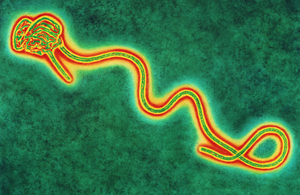Dr Edmund Newman of PHE to assist with Ebola screening
PHE scientist heads to Guinea to help with Ebola outbreak.

Ebola
Public Health England is aware that a number of cases of Ebola haemorrhagic fever have been reported from south eastern Guinea and Liberia. There are concerns about spread into the bordering countries of Sierra Leone and Senegal, and control measures such as isolation of cases and active monitoring of contacts are being implemented.
The European Mobile Outbreak Response Lab received a formal request for assistance from the Guinean Ministry of Health and the World Health Organisation. Public Health England’s Virology group are key members of the EU lab consortium, and scientist Dr Edmund Newman will be amongst the group of EU scientists delivering support on the ground.
The EMLab project includes partners from Germany, Italy, France, Hungary, Switzerland, Slovenia and the United Kingdom. The EMLab project’s main objectives are to establish mobile laboratory units as well as a collaborative network involving European and African institutions.
A team of EU scientists have set up a field lab to test suspect cases, working alongside Médecins Sans Frontières at an isolation centre near the borders with Sierra Leone and Liberia. As one of the EMLab’ s team leaders, Dr Newman will add resilience to the current team and manage the transition between the first and second lab teams in the field.
Dr Edmund Newman, project team leader for Virology and Emerging Infections at PHE’s Porton Down site said:
Although PHE is primarily an England focused agency, it has a strong commitment to global health security, and supports international humanitarian work. The virology research group have a global outlook, carrying out surveillance of, and response to, such highly pathogenic viruses around the world and improving the UK’s ability to detect these diseases.
As a WHO collaborating lab, we’re proud that we can work alongside our European scientific colleagues and counterparts in Africa to set up a mobile lab to allow rapid testing of suspect cases, which is vital to containing the spread of the outbreak.
No imported cases of Ebola have ever been reported in the UK. The risk of a traveller contracting Ebola is very low without direct contact with the blood or body fluids of an infected person or animal.
People returning from Guinea who have a sudden onset of symptoms such as fever, headache, sore throat and general malaise within 3 weeks of their return should immediately seek medical assistance.